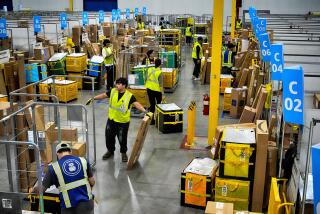U.S. Productivity Posts 1st Rise in 18 Months : Economy: But the good news is dampened by lower, revised figures for 1989.
- Share via
WASHINGTON — American workers’ productivity rebounded in the second quarter of 1990, rising at an annual rate of 1.6% for the first increase in 18 months, the government said today.
The rise in non-farm productivity--defined as output per hour of work--was the first increase since productivity climbed 0.5% in the final three months of 1988, the Labor Department said.
Though the report offered good news on American workers’ performance in the April-June period, the agency said revised figures on last year showed that productivity fell 0.3% rather than increasing 0.9% as first reported.
The poor 1989 showing was the worst since non-farm productivity fell 0.9% during the 1981-82 recession, the government said.
In revising numbers for the first quarter of 1990, the agency offered slightly better numbers, saying productivity fell 1.9% rather than the 2.7% decline first reported.
Today’s report showed that unit labor costs, a key gauge of future price inflation, rose 3.9% for the April-June period, compared with a 3.3% increase during all of 1989.
Hourly labor costs--a major inflation measure for businesses--rose at an annual rate of 5.6% the second quarter of 1990. Those costs increased by 3% for all of 1989.
In the manufacturing sector, productivity increased 3.7%, a big improvement over the 2% increase during all of 1989. Unit labor costs in that sector rose 2.6%, compared with the 2.2% increase all last year.
Total business productivity, including farming, rose 1.9% for the first quarter, compared with a 0.2% drop for all of 1989.
Since 1982, productivity growth has averaged 1.8% a year. Although a slight improvement over the 1.2% average growth rate in the 1970s, it was still far below the 3.3% rate of increase posted in the two decades after World War II. American workers enjoyed healthy wage gains and a rising standard of living during those decades.
Increasing productivity is considered basic to boosting living standards, because it allows businesses to pay workers more as their output rises, without risking higher inflation.
More to Read
Inside the business of entertainment
The Wide Shot brings you news, analysis and insights on everything from streaming wars to production — and what it all means for the future.
You may occasionally receive promotional content from the Los Angeles Times.










